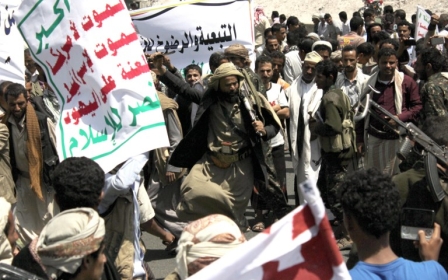Hard times drive down price of marriage in war-torn Taiz

Working as an accountant in the southern Yemeni city of Taiz, Walid Qasem was used to dealing with money, but when it came to his own love life he just could not make the numbers add up.
In 2010, the 29-year-old had become engaged to Amal al-Masani, a resident of the same now war-torn Yemeni city.
But with a monthly salary of 70,000 Yemeni rials ($326), the 1,000,000 Yemeni rials ($4,650) demanded as a dowry by his prospective father-in-law was beyond his financial reach.
As revolution and unrest swept through Yemen in 2011, Qasem’s prospects of ever marrying his fiancée appeared to fade even further.
“When the revolution broke out, I lost my job, and I didn’t find work again until 2013. I started to save about 40,000 rials a month, and in total I saved about 900,000 rials, but that still was not enough to marry,” Qasem told Middle East Eye.
Stay informed with MEE's newsletters
Sign up to get the latest alerts, insights and analysis, starting with Turkey Unpacked
"I was thinking of cancelling my engagement and letting my fiancee marry someone else, but she refused that, and told me that she would wait for me until her death.”
But with residents fleeing and businesses forced to close as Taiz last year became a focus of fierce fighting in Yemen’s war between resistance groups and Houthi rebels, in October Qasem received a call from Amal’s father, Husain al-Masani.
Masani had decided to shut down his shop in Taiz city and take his family back to his home village in the al-Maafer district.
"He called me and asked me to start preparing to get married, and said he would accept any dowry from me. We agreed about 300,000 rials and immediately I told my family and started getting everything ready," said Qasem.
The couple were married on 11 January 2016, and now live with Qasem’s parents and two sisters in Hawban, where he also rents a nearby house for his father-in-law.
Masani told MEE he had lost his only source of income when he closed his shop and could no longer afford to support his wife and five children, including his four daughters.
“The war forced me to close my shop and left me a jobless man and I spent all the money I’d saved in four months,” he said.
“When I agreed to my daughter’s marriage for 300,000 rials, I bought jewellery for 150,000 rials and I saved the rest to support my family.”
None of Masani’s four children still living with him had jobs, he said, so he plans to accept the same dowry from the suitor of another of his daughters, and said he would do the same for all of them even if his financial circumstances improve.
"In these bad conditions, it is not a shame that your daughter's dowry is cheap,” he added. “The shame is in begging people to help you, or leaving your daughter to become a spinster.”
Masani said that the war had made people more willing to help each other and more sympathetic for other families’ circumstances.
For the first few months of the war there were few weddings in Taiz, with families still demanding the sort of high dowries that were the norm before the conflict began.
But while some still insist on regular dowry payments, many now prefer to help their daughters marry rather than risk them never finding a husband.
Sami Alawi, a 56-year-old teacher in Taiz city, said he could still afford to support his seven family members, but had opted to allow his daughter Nailah to marry for 400,000 rials, which he said was enough for a bride and groom to marry and pay for a celebration.
"I know that the dowry in Taiz is between 800,000 and 1,000,000 rials, but the men cannot pay nowadays, as most of them lost their jobs, and if we did not help them, our daughters would never marry," he told MEE.
The decline in dowry payments has been endorsed by Ali bin Mohammed, an imam at Taiz’s al-Masbah Mosque, who said that the only conditions for a man to marry in Islam are that he is religious and has good morals, and that a dowry could be only a wedding ring.
Bin Mohammed has also expressed concern about the bad effects of expensive dowries, saying that they could lead men and women to resort to prostitution.
Naif Nouradeen, an expert on social customs in Taiz, said that dowries were usually determined by economic circumstances, and if the incomes of the people involved were low, the dowry would be reduced accordingly.
"Many men have lost their jobs and they cannot afford to pay an expensive dowry, so some parents have resorted to marrying off their girls for any dowry they can," Nouradeen added to MEE.
Nouradeen said that some families still considered it shameful to accept a cheap dowry, which had led to an increase in the number of unmarried women.
But he said that in current circumstances, most parents were thinking less about getting a good dowry for their daughters as opposed to finding men who would respect them and support them.
Middle East Eye delivers independent and unrivalled coverage and analysis of the Middle East, North Africa and beyond. To learn more about republishing this content and the associated fees, please fill out this form. More about MEE can be found here.




